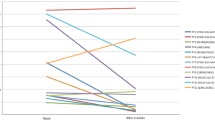Summary
Nineteen early-treated phenylketonuric patients, whose diet was discontinued between 4.5 and 13 years of age, and who have been off the diet for 12–28 years, were reassessed in 1992–93. There was little change in mean IQ between end of diet and follow-up, less than one IQ point on the average, with no change for any individual exceeding 12 IQ points. Both prior and current IQ correlated slightly negatively with mean phenylalanine (Phe) concentration, and positively with parents' education. The phenylalanine level at follow-up was significantly lower on average by about 900 µmol/L. Five of the subjects (26%) have evidence of mental disease. However, the data suggest that the discontinuation of the diet did not cause intellectual deterioration. Nonetheless, the patients' intellect cannot be the only consideration for maintenance of diet. The occurrence of psychopathology among phenylketonuric patients and the possible unknown effects of toxic elevation of phenylalanine during their lifetime suggest the need to maintain the diet. The use of DNA for diagnostic and prognostic purposes might assist in decisions about dietary quality and duration, and in anticipation of psychopathology.
Similar content being viewed by others
References
Chang PN, Cook DR, Fisch RO (1983) Prognostic factors of the intellectual outcome of phenylketonurics: on and off diet.J Psych Treat Eval 5: 157–163.
Cleary MA, Walter JH, Wraith JE, et al (1994) Magnetic resonance imaging of the brain in phenylketonuria.Lancet 344: 87–90.
Dobson JC, Kushida E, Williamson M, Friedman EG (1976) Intellectual performance of 36 phenylketonuria patients and their nonaffected siblings.Pediatrics 58: 53–58.
Fishler K, Azen CG, Friedman EG, Koch R (1989) School achievement in treated PKU children.J Ment Defic Res 33: 493–498.
Guldberg P, Henricksen KF, Güttler F (1993a) Molecular analysis of phenylketonuria in Denmark: 99% of the mutations detected by denaturing gradient gel electrophoresis.Genomics 17: 141–146.
Guldberg P, Romano V, Ceratto N, et al (1993b) Mutational spectrum of phenylalanine hydroxylase deficiency in Sicily: implications for diagnosis of hyperphenylalaninemia in Southern Europe.Hum Mol Genet 2: 1703–1707.
Güttler F, Guldberg P, Henricksen KL, et al (1992) Optimal planning of dietary therapy based on genotyping of hyperphenylalaninemic neonates.Enzyme 46: 259–271.
Holtzman NA, Welcher DW, Mellits ED (1975) Termination of restricted diet in children with phenylketonuria: A randomized controlled study.N Engl J Med 293: 1121–1124.
Holtzman NA, Richard A, Kronmal RA, van Doorninck W, Azen C, Koch R (1986) Effect of age at loss of dietary control on intellectual performance and behavior of children with phenylketonuria.N Engl J Med 314: 593–598.
Kang ES, Sollee ND, Gerald PS (1970) Results of treatment and termination of the diet in phenylketonuria (PKU).Pediatrics 46: 881–890.
Koch R, Azen CG, Friedman EG, Williamson ML (1982) Preliminary report on the effects of diet discontinuation in PKU.J Pediatr 100: 870–875.
Koch R, Friedman EG, Azen CG, Williamson ML, Donnell GN (1985) Report from the United States collaborative study of children treated for phenylketonuria (PKU). In Bickel H, Wachtel U, eds.Inherited Diseases of Amino Acid Metabolism. Stuttgart: George Thieme Verlag, 134–150.
Lou HC, Güttler F, Lykkelund C, Bruhn P, Niederwesier A (1985) Decreased vigilance and neurotransmitter synthesis after discontinuation of dietary treatment for phenylketonuria.Eur J Pediatr 144: 17–20.
Matthews WS, Barabas G, Cusack E, Ferrari M (1986) Social quotients of children with phenylketonuria before and after discontinuation of dietary therapy.Am J Ment Defic 91: 92–94.
McCaman MW, Robins E (1962) A fluorimetric method for the determination of phenylalanine in serum.J Lab Clin Med 59: 885–890.
McCombe PA, McLaughlin DB, Chalk JB, McGill JJ, Pender MD (1992) Spasticity and white matter abnormalities in adult phenylketonuria.J Neurol Neurosurg Psychiatry 55: 359–361.
Michals K, Dominik M, Schuett V, Brown E, Matalon R (1985) Return to diet therapy in patients with phenylketonuria.J Pediatr 106: 933–936.
Michals K, Azen C, Acosta P, Koch R, Matalon R (1988) Blood phenylalanine levels and intelligence of 10-year-old children with PKU in the National Collaborative Study.J Am Diet Assoc 88: 1226–1229.
Okano Y, Eisensmith RC, Güttler F, Lichter-Konecki U, et al (1991) Molecular basis of phenotypic heterogeneity in phenylketonuria.N Engl J Med 324: 1232–1238.
Saudubray JM, Rey F, Ogier H, et al (1987) Intellect and school performance in early-treated classical PKU patients.Eur J Pediatr 146(Supplement): 10A20–22.
Schuett VE, Gurda RF, Brown ES (1980) Diet discontinuation policies and practices of PKU clinics in the United States.Am J Public Health 70: 498–503.
Schuett VE, Brown ES (1984) Diet policies of PKU clinics in the United States.Am J Public Health 74: 501–503.
Seashore MR, Friedman E, Novelly RA, Bapat V (1985) Loss of intellectual function in children with phenylketonuria after relaxation of dietary phenylalanine restriction.Pediatrics 75: 226–232.
Smith I, Lobascher ME, Stevenson JE, et al (1978) Effect of stopping low-phenylalanine diet on intellectual progress of children with phenylketonuria.Br Med J 2: 723–726.
Smith I, Beasley MG, Ades AE (1991) Effect on intelligence of relaxing the low phenylalanine diet in phenylketonuria.Arch Dis Child 65: 311–316.
Thompson AJ, Smith I, Brenton D, et al (1990) Neurological deterioration in young adults with phenylketonuria.Lancet 336(8715): 602–605.
Weglage J, Fünders B, Wilken B, et al (1992) Psychological and social findings in adolescents with phenylketonuria.Eur J Pediatr 151: 522–525.
Welsh MC, Pennington BF, Ozonoff S, Rouse B, McCabe ER (1990) Neuropsychology of early-treated phenylketonuria: specific executive function deficits.Child Dev 61: 1697–1713.
Williamson ML, Koch R, Azen C, Chang C (1981) Correlates of intelligence test results in treated phenylketonuric children.Pediatrics 68: 161–167.
Wood B (1976) Neurological disturbance in a phenylketonuric child after discontinuation of dietary treatment.Dev Med Child Neurol 18: 657–660.
Author information
Authors and Affiliations
Rights and permissions
About this article
Cite this article
Fisch, R.O., Chang, P.N., Weisberg, S. et al. Phenylketonuric patients decades after diet. J Inherit Metab Dis 18, 347–353 (1995). https://doi.org/10.1007/BF00710427
Received:
Accepted:
Issue Date:
DOI: https://doi.org/10.1007/BF00710427




